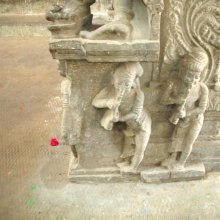Phulla: 21 definitions
Introduction:
Phulla means something in Buddhism, Pali, Hinduism, Sanskrit, Jainism, Prakrit, Hindi. If you want to know the exact meaning, history, etymology or English translation of this term then check out the descriptions on this page. Add your comment or reference to a book if you want to contribute to this summary article.
Phulla has 20 English definitions available.
Alternative spellings of this word include Full.
Images (photo gallery)
Languages of India and abroad
Sanskrit dictionary
[Deutsch Wörterbuch]
Source: Cologne Digital Sanskrit Dictionaries: Böhtlingk and Roth Grosses Petersburger WörterbuchPhulla (फुल्ल):—(partic. von 1. phal) [Pāṇini’s acht Bücher 7, 4, 89. 8, 2, 55.]
1) adj. f. ā (gespalten, aufgebrochen) aufgeblüht, blühend, mit Blumen besetzt [Vopadeva’s Grammatik 26, 101.] [Amarakoṣa 2, 4, 1, 8.] [Trikāṇḍaśeṣa 2, 4, 3.] [Hemacandra’s Abhidhānacintāmaṇi 1127.] padma [Mahābhārata 3, 8360.] [Rāmāyaṇa] [Gorresio 2, 66, 66. 3, 52, 19.] [Mṛcchakaṭikā 13, 19. 61, 2.] [Raghuvaṃśa 9, 63.] [Ṛtusaṃhāra 6, 6.] [Geschichte des Vidūṣaka 285.] [Caurapañcāśikā 1.] kānana [Mārkāṇḍeyapurāṇa 63, 1.] aśokānāṃ vanānīva phullāni kusumaiḥ śubhaiḥ [Mahābhārata 4, 1704.] phullāsu ca padminīṣu [13, 521.] saras [1, 1811.] sarāṃsi ca suphullāni [Rāmāyaṇa 2, 68, 14.] weit geöffnet (von Augen): sphuṭatkumudinīphullollasallocanā [Spr. 546.] von einem lachenden Gesicht und einer aufgeblühten Wasserrose [kāvyādarśa 2, 193.] —
2) m. Nomen proprium eines Heiligen [MACK. Coll. I, 78.] —
3) n. eine aufgeblühte Blume: śrīpañcamyāṃ śriyaṃ devīṃ phullaiḥ saṃpūjayetsadā [Kalikāpurāṇa im Śabdakalpadruma]
Source: Cologne Digital Sanskrit Dictionaries: Sanskrit-Wörterbuch in kürzerer FassungPhulla (फुल्ल):——
1) Adj. (f. ā) — a) aufgeblüht , blühend. — b) mit Blumen besetzt. — c) weit geöffnet (Augen). — d) aufgeblasen (Backen) [Bālarāmāyaṇa 54,4.] — e) lachend (Gesicht). —
2) m. Nomen proprium eine aufgeblühte Blume.
Sanskrit, also spelled संस्कृतम् (saṃskṛtam), is an ancient language of India commonly seen as the grandmother of the Indo-European language family (even English!). Closely allied with Prakrit and Pali, Sanskrit is more exhaustive in both grammar and terms and has the most extensive collection of literature in the world, greatly surpassing its sister-languages Greek and Latin.
See also (Relevant definitions)
Starts with (+14): Phulladaman, Phulladruma, Phullaga, Phullaisu, Phullaka, Phullalocana, Phullalochana, Phullamalla, Phullambika, Phullamdhaya, Phullana, Phullanalini, Phullanana, Phullanayana, Phullanetra, Phullapadma, Phullapadmotpalavat, Phullaphala, Phullapota, Phullapura.
Ends with (+9): Akhandaphulla, Aphulla, Apraphulla, Aviphulla, Bondorphulla, Harshaphulla, Harshotphulla, Khandaphulla, Nishaphulla, Pamphulla, Papphulla, Papphulla, Pariphulla, Phaliphulla, Praphulla, Protphulla, Sampaphulla, Samphulla, Sampraphulla, Samutphulla.
Full-text (+42): Phullaphala, Pulla, Phullanayana, Phullavadana, Phaulli, Phull, Aphulla, Samphulla, Phullalocana, Praphulla, Phulladaman, Phullatuvari, Vataphulla, Phullambika, Phullotpala, Pratiphullaka, Phullaranyamahatmya, Phullanetra, Praphulta, Phullas.
Relevant text
Search found 10 books and stories containing Phulla, Phullā; (plurals include: Phullas, Phullās). You can also click to the full overview containing English textual excerpts. Below are direct links for the most relevant articles:
Sahitya-kaumudi by Baladeva Vidyabhushana (by Gaurapada Dāsa)
Text 11.10 < [Chapter 11 - Additional Ornaments]
Text 9.38 [sword diagram] < [Chapter 9 - Ornaments of Sound]
Text 9.38 < [Chapter 9 - Ornaments of Sound]
Bhakti-rasamrta-sindhu (by Śrīla Rūpa Gosvāmī)
Verse 4.1.22 < [Part 1 - Laughing Ecstasy (hāsya-rasa)]
Verse 3.3.66 < [Part 3 - Fraternal Devotion (sakhya-rasa)]
Verse 4.8.40 < [Part 8 - Compatible & Incompatible Mellows (maitrī-vaira-sthiti)]
Garga Samhita (English) (by Danavir Goswami)
Verses 1.11.25-29 < [Chapter 11 - Description of Śrī Kṛṣṇacandra’s Birth]
Rasa Jala Nidhi, vol 2: Minerals (uparasa) (by Bhudeb Mookerjee)
Part 1 - Characteristics of Kankshi/Tubari (clay containing alum) < [Chapter XI - Uparasa (12): Kankshi (clay containing alum)]
Maha Prajnaparamita Sastra (by Gelongma Karma Migme Chödrön)
Appendix 1 - The five hundred insults and five hundred praises to the Buddha < [Chapter XLII - The Great Loving-kindness and the Great Compassion of the Buddhas]
Sanskrit sources of Kerala history (by Suma Parappattoli)
2. The Sukasandesa by Mahakavi Lakshmidasa < [Chapter 4 - Traces of Historical Facts from Sandesha Kavyas and Short poems]
